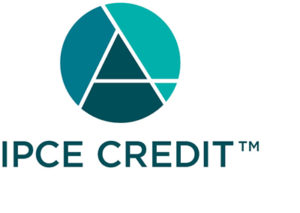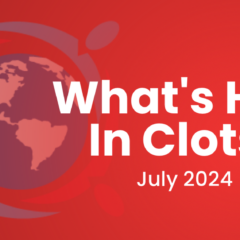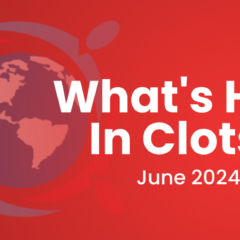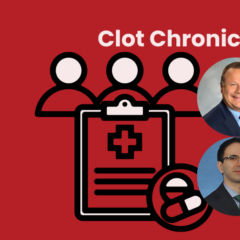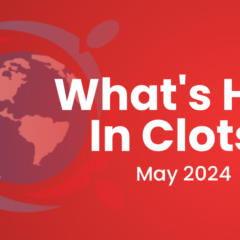Last updated on
New Strategies for Managing DOAC-Associated Bleeding
This CME/CE online activity is provided by Albert Einstein College of Medicine – Montefiore Medical Center in joint providership with the North American Thrombosis Forum.

ACTIVITY DESCRIPTION / STATEMENT OF NEED:
This program offers insight into the most recent medical research on protecting patients at risk for bleeding while taking a direct oral anticoagulant (DOAC) and provides further guidance for clinicians who treat patients on—or who are a candidate for—DOAC therapy. We’re pleased to welcome world-class experts in cardiology, vascular medicine, emergency medicine, hospital medicine, and pharmacy to update us on this challenging topic. The activity addresses the specific bleeding risks associated with DOACs and discusses approaches for managing bleeding in vulnerable patients. The program concludes with a discussion on optimizing systems-based practices for DOAC reversal and re-initiation.
TARGET AUDIENCE
Physicians, nurse practitioners, physician assistants, nurses, and pharmacists in the fields of cardiology, emergency medicine, neurology, primary care, critical care, and hematology.
EDUCATIONAL OBJECTIVES:
Upon completion of the educational activity, participants should be able to:
- Identify factors that drive bleeding risk in patients on direct oral anticoagulation (DOACs)
- Describe strategies to prevent or minimize DOAC-associated bleeding
- Determine when to use DOAC reversal agents
- Assess the balance of bleeding and thrombotic risk in patients taking DOACs
- Recognize the importance of restarting DOAC therapy after a bleeding event
| AGENDA |
DOAC-Associated Severe Bleeding: An Unwelcome Guest in Anticoagulant Care Ty J. Gluckman, MD, FACC Medical Director, Center for Cardiovascular Analytics, Research and Data Science (CARDS) Providence St. Joseph Health A Land of Confusion: Understanding the Different Reversal Options for DOAC-Associated Bleeding Geoffrey Barnes, MD Assistant Professor of Medicine, University of Michigan Discerning Fact from Fiction in DOAC Reversal: A Case-Based Review of Common Management Pitfalls Gregory Piazza, MD, MS Associate Professor of Medicine, Harvard Medical School Section Head, Vascular Medicine Division and Staff Physician, Cardiovascular Division, Brigham and Women’s Hospital The Guidelines in 20 Minutes: Key Learnings from the Guidelines on Reversing DOACs Margaret C. Fang, MD, MPH Professor of Medicine, The University of California, San Francisco Anticoagulation Clinic Director, The University of California, San Francisco Systems-Based Approaches to Appropriate Use of DOAC Reversal, Management of Bleeding, and Reinitiating Anticoagulation Elisabeth Sulaica, PharmD, BCCP Clinical Assistant Professor, University of Houston College of Pharmacy Cardiology Clinical Pharmacist, Michael E. DeBakey Veterans Affairs Medical Center |
CME/CE INFORMATION
This CME/CE online activity is provided by Albert Einstein College of Medicine – Montefiore Medical Center in joint providership with the North American Thrombosis Forum.
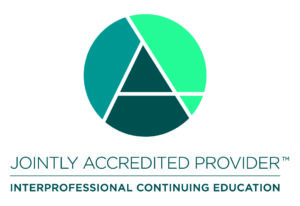
ICPE Credit Designation Statement: This activity was planned by and for the healthcare team, and learners will receive 1.75 credits Interprofessional Continuing Education (IPCE) credit for learning and change.
Credit Designation Statements:
Physicians: Albert Einstein College of Medicine- Montefiore Medical Center designates this enduring material activity for a maximum of 1.75 AMA PRA Category 1 Credits™. Physicians should claim only the credit commensurate with the extent of their participant in the activity.
Nurses: This activity is awarded 1.75 contact hours. (based on 60 minutes per contact hour).
Pharmacists: This knowledge-based activity UAN # JA4008224-9999-21-007-H01-P qualifies for 1.75 contact hours (0.175 CEUs) of continuing pharmacy education credit.
FEE INFORMATION
Participation in this activity is made possible, free of charge, with the support of Alexion Pharmaceuticals, Inc.
RELEASE DATE: May 13, 2021 — EXPIRATION DATE: November 13, 2021
DISCLOSURE OF CONFLICTS OF INTEREST POLICY:
Conflict of Interest Statement
The “Conflict of Interest Disclosure Policy” of Albert Einstein College of Medicine-Montefiore Medical Center requires that faculty participating in this CME/CE activity disclose to the audience any relevant relationship(s) with a pharmaceutical or equipment company. Any presenter whose disclosed relationship(s) prove to create a conflict of interest, with regard to their contribution to the activity, or who refuses to provide all their conflict of interest information, is not permitted to present.
Albert Einstein College of Medicine/Montefiore Medical Center: CCME also requires that faculty participating in this CME/CE activity disclose to the audience when discussing any unlabeled or investigational use of any commercial product, or device not yet approved for use in the United States.
Faculty and Planners Disclosures:
-
- Dr. Piazza (planner and faculty) has received grant research from BMS/Pfizer, BSC, Janssen, Portola and Bayer. These relationships will not prevent him from making an unbiased and fair balance presentation.
- Dr. Barnes (faculty) has been a consultant for Pfizer/Bristol Myers Squibb, Janssen, Acelis Connected Health and AMAG Pharmaceuticals. These relationships will not prevent him from making an unbiased and fair balance presentation.
- Dr. Fang (faculty) presents no relevant conflict of interest.
- Dr. Gluckman (faculty) presents no relevant conflict of interest.
- Dr. Sulaica (faculty) presents no relevant conflict of interest.
- John Fanikos, RPh, MBA (planner) presents no relevant conflict of interest.
- Ruth Morrison, RN, BSN, CVN (planner) presents no relevant conflict of interest.
- Aviva Schwartz, MA (NATF planner) presents no relevant conflict of interest.
ACCREDITED PROVIDER DISCLOSURES
Peer Reviewers:
-
- Henny Billett, MD (content validation) presents no relevant conflict of interest.
- Victor Hatcher, Ph.D. (Einstein-Montefiore CME Reviewer) presents no relevant conflict of interest.
DISCLOSURE OF UNLABELED USE
Off-Label Disclosure:
-
- Dr. Barnes will talk about andexanet alfa and 4-factor prothrombin complex concentrate uses in DOAC reversal.
DISCLAIMER:
The opinions expressed in this educational activity are those of the faculty and do not necessarily represent the views of Albert Einstein College of Medicine – Montefiore Medical Center, NATF, or the supporting company (Portola). Please refer to the official prescribing information for each product for discussion of approved indications, contraindications, and warnings.
INSTRUCTIONS:
To receive CME credits, participants must complete the pre-assessment questions, post-test, and program evaluation. Participants must also score at least 70% on the posttest. Certificates will be distributed online at the conclusion of the activity. Your online certificate will be saved on myCME within your Profile/Exam History, which you can access at any time.
For information about the accreditation of this program, please contact
CME/CE Contact Information: [email protected]
Technical Contact Information: [email protected]
Copyright: Albert Einstein College of Medicine-Montefiore Medical Center has received permission to use copyrighted materials for this CME/CE activity.
Hardware requirements: The minimum hardware requirements including the minimum memory, storage, processor speed and multimedia components required by the learner
Software requirements: The minimum software requirements including, where appropriate, the Internet Browser(s) and minimum version along with any Browser “Plug-Ins” that may be required
Internet: The Internet connectivity and minimum connection speed the learner must have.
